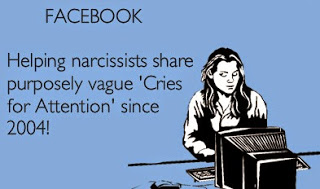What Does Your Facebook Status Say About You?
Research from Brunel University in London suggests that people who post frequent status updates relating to their romantic partner or accomplishments are more likely to suffer from low self-esteem. Facebook appears to be a means to obtain the social inclusion and acceptance certain individuals long for. The researchers surveyed 555 Facebook users to examine personality traits (extroversion, neuroticism, openness, agreeableness and conscientiousness) as well as explore motivation behind postings. Researchers also studied their degree of self-esteem and narcissism.The research found: People with low self-esteem more frequently posted status updates about their current romantic partner.Narcissists more frequently updated about their achievements, which was motivated by their need for attention and validation from the Facebook community. These updates also received a greater number of ‘likes’

Research from Brunel University in London suggests that people who post frequent status updates relating to their romantic partner or accomplishments are more likely to suffer from low self-esteem. Facebook appears to be a means to obtain the social inclusion and acceptance certain individuals long for.
The researchers surveyed 555 Facebook users to examine personality traits (extroversion, neuroticism, openness, agreeableness and conscientiousness) as well as explore motivation behind postings. Researchers also studied their degree of self-esteem and narcissism.
The research found:
- People with low self-esteem more frequently posted status updates about their current romantic partner.
- Narcissists more frequently updated about their achievements, which was motivated by their need for attention and validation from the Facebook community. These updates also received a greater number of ‘likes’ and comments, indicating that narcissists’ boasting may be reinforced by the attention they crave.
- Narcissists also wrote more status updates about their diet and exercise routine, suggesting that they use Facebook to broadcast the effort they put into their physical appearance.
- Conscientiousness was associated with writing more updates about one’s children.
Obviously there is no surprise that Facebook activity reflects one’s personality, however, certain behaviours that are typically not that well tolerated may be rewarded and encouraged when status updates receive more attention via “likes” and “comments”.
For example, many “Facebook friends” may feel obliged to support incessant bragging because others, when in reality they generally find the behaviour nauseating. This would only perpetuate further narcissistic behaviour. The same could be said of those relentless “woe is me” status updates or the daily profile picture changes etc.
On the other hand, people that tend to post less frequently could receive less “likes” and “comments”, which could lead to social exclusion and lowered self-esteem. In other words, Facebook may build up less well-adjusted individuals and break down the stability and security of others.
It would be interesting to see research on the “friends” that respond to such status updates, such as their likeability, personality traits and their own behaviour in the Facebook world.
It might be time to examine our own Facebook activity…
Facebook status updates reveal low self-esteem and narcissism
SOURCE: Mental Health Blog – Read entire story here.









